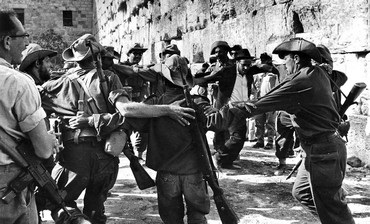
This is the day of Chesed within Malchut, love within nobility. On this day, I think about how we often believe that the "noble thing to do" is to act tough-minded and dispassionately. We fail to recognize that our compassion and instinct toward kindness and forgiveness is also what makes us noble.
On this date on the Hebrew calendar, the Israeli army overcame Jordanian forces to capture the Old City of Jerusalem and reclaimed the holiest site in Judaism, the Western Wall. The move into the Old City came after Israel had told King Hussein of Jordan that Israeli forces would not move into Jerusalem if there was no aggression against Israel along that front. Despite the warning, Jordan began shelling Israeli civilians on June 6, 1967. Before the end of the following day, Israel had captured East Jerusalem. The war was over. For the first time in two millennia, the Jewish people had sovereignty over their holiest site.
Moshe Dayan, Israel's Defense Minister, famously declared, "We have united Jerusalem." He assured the Arab states that Israel would allow the Muslim and Christian holy places in the Old City to remain under the control of the religious authorities of their faiths. Israel has kept that promise to this day. However, there is something in Dayan's pronouncement that does not ring true – or, perhaps, that seems unfulfilled.
Jerusalem today is not united. In fact, Jerusalem has become less and less united in the decades since the Six Day War. Today the city is divided with entirely separate sections and neighborhoods for Jews and Arabs. Very few Jews wander into the Arab neighborhoods and few Arabs wander into Jewish neighborhoods.
It is not only ironic, it is painful and heartbreaking that on the day of "love in nobility" there is little love or nobility on either side of the divide. In recent years, some Jews have used Yom Yerushalayim as an occasion for loud and provocative marches through Arab neighborhoods that are designed to infuriate and humiliate Arabs. Many Arabs have a parallel observance on the Muslim calendar, called Quds Day, to denounce Israel and call for its destruction.
I hope for the day when Yom Yerushalayim is not a day for Jews to gloat and incite hatred over the defeat of the Arabs; I hope for the day when Arabs do not see this as a day to swell in their prideful anger. Yom Yerushalayim should be a day, as Moshe Dayan declared, for Jews and Arabs to dwell together in unity. That is a much greater nobility than the hatred and recrimination that defines the divide today.
On this 43rd Day of the Counting of the Omer, I pray for the nobility to have compassion, even for enemies. I commit to opening my heart in genuine caring and forgiveness and to find a bit of the nobility that is lacking in this fractured world.
May this be a day in which you discover the love that is at the heart of the highest nobility.
For the introduction to the Counting of the Omer, click on this link:
The First Day of the Counting of the Omer



 RSS Feed
RSS Feed
